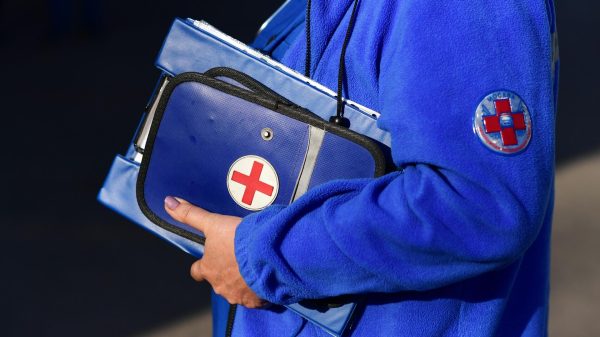Comfort Obinna sat in the shade of a mango tree she planted 25 years ago, above a sea of broken blocks of concrete.
The rubble covers the compound that used to be her modest home on Tarkwa Bay Beach in Lagos. Now nearly everything the 73-year-old owned, including the space where she farmed her chickens and pigs, has been lost.
“I planted this tree in 1996,” Obinna said, grasping the trunk and breaking into tears. “Look at where I sleep,” she added, pointing to a makeshift bed made from rags and strips of wood. “I don’t have anywhere else to go so I stay here.”
‘I’m a fighter’: WTO’s first female, African head ready for battle
Read more
Since December 2019, Nigerian authorities have destroyed hundreds of homes and businesses in waves of violent mass evictions on the lagoons and islands that dot the waterways of the country’s largest city, leaving thousands of mostly poor people homeless. Many, like Obinna, continue to live in the rubble of their demolished compounds, with nowhere else to go.
The port authority and the navy units that carry out the evictions accuse residents of either stealing oil from the pipelines that run beneath the waterways or turning a blind eye to the theft, thereby depriving the city’s coffers of revenues.
But residents say the accusations are a smokescreen, and that the real reason for the evictions is to clear valuable seafront expanses for luxury commercial developments and beachfront getaways for the middle class, which have sprung up across the islands. A month after the demolitions began, Lagos’s government announced its intention to build a tourist resort on Tarkwa Bay.
Across the water, on sand dredged from the sea, a handful of skyscrapers mark the site of Eko Atlantic, an enormous and controversial “private city” development off the coast of Victoria Island.
According to the Justice Empowerment Initiative, a Lagos-based organisation that provides training and resources for people in poor communities, tens of thousands of people, several with roots going back generations on the islands have been displaced from Tarkwa Bay and nearby islands. Many – like Obinna – are migrants and refugees from along the west African coast.
Lagos map
Some have moved to other islands where demolitions are less frequent, others to informal settlements on the mainland, where by some estimates two-thirds of the city’s population of 15 million live. The prevalence of the informal settlements is a direct result of a lack of affordable housing: social housing is virtually nonexistent, and exorbitant private rents are beyond the means of many.
The navy says all evictions take place after adequate notice is given, but this is heavily disputed by residents and campaigners who say they take place suddenly and in defiance of property rights.
In January 2020, the high court ruled in a case brought by several communities against the navy and the Nigerian government that the demolitions must stop, but they continue regardless.
Mohammed Zanna lived on Tarkwa Bay for 12 years in a small room attached to a home before it was demolished last year. He and many others are now fighting the evictions in court, supported by the Nigerian Slum/Informal Settlement Foundation, a grassroots organisation representing vulnerable communities.
“Forced evictions are illegal under human rights law,” he said. “Even the Nigerian constitution and law guarantees the rights to adequate shelter, housing for all. There must be due process and resettlement planning but this never happens.”
On a recent morning in Tarkwa Bay navy vehicles patrolled through the sandy roads, between now demolished expanses of homes and businesses. Signs bearing the logo of the Nigerian Army Post Exchange dominated the beachfront, and army officers guarded and operated a chic white hotel and poolside lounge, where rooms cost up to $270 per night.
A family evicted from their home in January of this year, who asked not to be named, said the navy ignored their pleas to be allowed to stay. Now they are squatting in a half-constructed building nearby.
Nigeria cattle crisis: how drought and urbanisation led to deadly land grabs
Read more
As more upmarket entities spring up, “occupancy licences” granted to local businesses are being revoked by the Nigerian Port Authority. Locals allege that the few remaining small businesses making money on the beachfront are either run by the military or forced to pay extortionate commission fees to stay in private hands.
Plastered around the bay are large posters erected by the armed forces, banning “homosexuality”, “drones” and unlicensed businesses.
“They [the military] control everything on Tarkwa Bay,” said Dare, a commercial boat rider, as he ferried planks of pinewood from the beach that he had stripped from his father’s home. “We have to tear down the house because if we don’t, we know what will happen,” he said. “We thought, it’s better to take our materials rather than let them destroy it.”
Taibat Lawanson, an associate professor of urban planning at the University of Lagos, said low-income communities have paid the price of every attempt by local authorities to expand and develop the city.
The problem stems in part from antiquated, unreformed land ownership laws dating from the 1970s. Land and property is sold and leased in a range of ways, Lawanson said, and many poor people do not have the proof of ownership that authorities often demand before proceeding with evictions.
“Many people are unable to move from holding a receipt (for their land) to having the land officially registered with the state government,” Lawanson said. “When they do, they have to go through this process of ratification, which is essentially buying the land twice.
“The challenge that low-income communities have is that they lack political capital, they don’t have influence, and their land is usually located in a place that has economic potential beyond its current use.”
Obinna, who fled to Lagos from Liberia in the 1970s, recalls the moment she lost her home. “They brought a caterpillar and levelled everything just like that,” she said. “They didn’t give any notice. I told them this is my land, bought for me by my former boss, but they didn’t care.”

















































Свежие комментарии